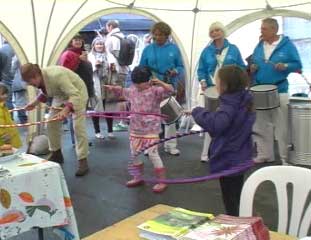Childrens Street Games
Return to
Playsafe Sessions give children the opportunities which adults of today had when roads in residential areas were less busy and dangerous. Safe play is made possible through a short-term road closure organised in cooperation with local residents and The Council's transport department.
Which street games were played in the past?
The website at www.mybrightonandhove.org.uk has several comments written by former Round Hill residents about their childhoods. There is some reference to play, though there could be more.
Not all games are suitable for tightly packed streets, but there are some which may remain popular or could be adapted to tighter spaces.
Two well known types of games, which will always remain, are hopping and skipping.
Hopping & Skipping
Chalk markings in some city streets show that hopscotch is still played, though limited pavement space and hilly terrain mean that conditions for this game are less than ideal in Round Hill.
Road closures for supervised playsafe sessions could provide scope for traditional skipping games if children still consider them fashionable.
In some Brighton streets, a long rope was extended from one pavement of the street to the other, but please don't try this today unless the road is really closed!
Several patterns of skipping were common: alternate feet, synchronised with 2 or more children skipping together, 2 children skipping back-to-back, high stepping / trotting / and other special leg movements.
Balls, Hoops, Tops & other Props
With so many windows & parked cars around and so little open space, ball games will probably find limited favour among adults in Round Hill streets. However, we have seen hula hoops in evidence: e.g. during The Round Hill Society's June 2011 street party.

Outdoor tops are probably a thing of the past and there are more suitable places for kite-flying e.g. in Brighton's larger parks.
Rhythm, Verse, Song, Drama & Story
Many games, including skipping, used clapping, rhythm, verse & song, acting &/or story-telling as a background. Some games took the form of initiation ceremonies; others were used to mark special events, dates or seasons.
Verbal games included oaths of allegiance, nonsense verses, counting out rhymes for purposes of elimination or taking captives e.g. the songs oranges & lemons and London Bridge.
Looking forward to adulthood
Impersonation of adults took on different forms. There were courting games, usually set to song, associated with match-making and weddings (Every soap opera needs the occasional wedding). The theme of "good" versus "evil" was exploited through games such as cops & robbers, cowboys & indians and other role play games, some which may no longer be considered as politically correct.
Marking out territories
Children always seem to have enjoyed structuring their play, unless geometric formations were merely suggested by adults telling children to get into line or form a circle. Street furniture was also adopted for play purposes: e.g. lamp posts marked finishing lines; walls marked boundaries or formed props (especially for ball games).
Freedom both to copy and to invent
With play returning to our streets through playsafe sessions, scope also returns for memories and ideas. The Round Hill Society would welcome descriptions either by children or adults of games which may enrich these sessions. However, freedom to invent ones own games should always remain an option. Having the open space to allow mixing between neighbours makes it possible for children both to continue good traditions and to invent future ones.
Further references
Well known books on play include The Lore & Language of Schoolchildren and The Singing Game both by Iona & Peter Opie (Oxford University Press).
This page was last updated by Ted on 05-Dec-2024